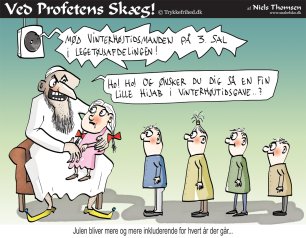Accused by the Dutch ‘Openbaar Ministerie’ exactly a year ago for insulting Islam, comparing the Koran to Mein Kampf and delivering hate speeches, the coming trial against Wilders suddenly got a Kafkaesque and potentially murderous twist. Finally, seven days before his first day in Court, all fangs were out and faces off.
“It is irrelevant whether Wilder’s witnesses might prove Wilders’ observations to be correct”, the ‘Openbaar Ministerie’ stated, “what’s relevant is that his observations are illegal”. Unexpected and breaching court procedures the detailed indictment of 21 pages, which Wilders received on the 4th of December and sums up in verbatim all of his Islam and Koran critique in interviews and Fitna, was amended with new accusations of racism against muslims and Moroccans. On top of this, Paul Vellerman, the public prosecutor of the Amsterdam Court decided that the Wilders trial had to be regarded as “an ordinary trial open for public and with a normal procedure, which doesn’t deserve the Department of Justice’s highly secured bunker. His is a normal case and we’ll treat it as such”.
It’s sad to note that Mohammed Bouyeri, the murderer of Theo van Gogh, and Volkert van der Gaag, the assassin of Pim Fortuyn, were tried in this specially designed bunker, but that Wilders has to rely on his personal bodyguards and full metal jacket to ward of terrorists. No safe room for him, which recently secured Kurt Westergaard and his granddaughter, but for months on end the vulnerability of a sitting duck.
The demonized Fortuyn
To a connoisseur of the classic art of Dutch political murder, revived in 2002 with the assassination of the deliberatedly unprotected and demonized Pim Fortuyn, this twist of fate comes, however, as no surprise. The ‘Openbaar Ministerie’ had to do something. Presented with much aplomb in January, already on the 10th of March it turned out that the case against Wilders had one crucial weak spot: it might not hold in Court. For in a comparable case the Dutch High Court acquitted a Dutchman of his earlier conviction of ‘Group-insult’ of Muslims. He had been sentenced to jail for hanging a poster in front of his window that stated: “Stop the cancerous growth named Islam”. The High Court ruled that “if one insults a religion, one doesn’t automatically insult its believers”.
Gerard Spong, one of the lawyers who lodged complaints against Wilders, was quick to stress, however, that the case against an MP was far more complex than a poster: “Wilders is certainly not off the hook”. But to most professors in Law the High Court ruling proved that Wilders would win with his hands down. Ybo Buruma, a highly influential professor in Criminal Law at Nijmegen University concluded on the 11th of January 2010 that “the prosecution of Geert Wilders is a very nice exercise, but is utterly pointless for it will not lead to a conviction”.
Traditionally with such a High Court ruling and severe scholarly critique the ‘Openbaar Ministerie’ wouldn’t fail to reconsider and dismiss charges. But already a year ago the Wall Street Journal had immediately grasped that “Muslim-immigration [was] eroding traditional Dutch liberties”, forcing Dutch Law into a radically new course of censorship. Observing that Wilders’ critique of Islam outraged muslims around the globe, the Journal chided: “If freedom of speech means anything, it means the freedom of controversial speech. Consensus views need no protection”.
The Wall Street Journal must have been either clairvoyant or hysterically well informed: Paul Vellerman, Amsterdam’s Court public prosecutor, and Birgit van Roessel, the Court’s second public prosecutor, who’re both heading the trial against Wilders, also both are working for the National Expertise Centre Discrimination. This Centre is the leading organization of the ‘Openbaar Ministerie’ to track down “crimes of expression and speech”. The Centre was responsible for lodging complaints against cartoonist Gregorius Nekschot.
The un-dutch Wilders
And Paul Vellerman, now in his role as public prosecutor, was the one who called for Nekschot’s violent apprehension. Vellerman also dismissed charges against Gretta Duisenberg, widow of Wim Duisenberg, first treasurer of the EU, and staunch defender of Hamas. And, tellingly, he also dismissed charges against the orthodox El Tawheed mosque, which the Dutch Secret Service suspects of breeding terrorists. Mohammed Bouyeri was one of El Tawheed’s regular attendants.
Hence, Vellerman and Roessel not only religiously persisted in their original indictment, but helped by Fokko Oldenhuis, Groningen University professor Religion and Law, planned to come up with new ones. According to Oldenhuis on the 17th of December in Elsevier, “the statements of Wilders are un-Dutch, they don’t belong to our Christian-Judaic culture”; “He discriminates Moroccans because of their race and causes hate against them”; “His desire to ban the Koran brings fear and terror into peoples homes”; “The laws against hate crimes were made in 1934, to protect the Jews in a reaction to what was happening in Germany. That is telling. Prudently, parallels can be made –these laws had a clear cut political context”.
The press was barred admittance
On the morning of the 13th of January, Bram Moszkowicz, an € 1000,-- per hour lawyer and host of his own television show, was still unaware of the disaster that was bound to happen. Full of confidence he and Geert Wilders went to the Amsterdam Court for a so called preliminary procedural session. As Wilders lawyer and helped by experts like Buruma he had sound arguments to ask for acquittal on most accusations of the 21 pages indictment. Perhaps even, all would stop that day. The High Court ruling of March was consistent enough.
Also Wilders must have been high spirited. A week before he had given an interview to the Elsevier that was due to be published that afternoon. He had stated “to be completely confident that he would win this political trial and walk out as a free man.” In fact, for the first time Wilders spoke of his strategy after his victory in the coming national elections: “Pia Kjaersgaard’s Danish model is highly appealing. On the other hand, we’ll be the biggest party and ought to form the new Cabinet”. Expressed like that Geert Wilders claimed the position of prime-minister of the next Cabinet.
Still, they must have smelled something fishy when arriving at the Amsterdam Court. Completely unexpected and unprecedented the press was barred admittance and denied coverage of the proceedings. Thomas Bruning, secretary of the Dutch Society of Journalists spoke of a “serious incident, hindering the freedom of the press, and lessening the public function of a court of law.” The Amsterdam Court responded by stating “we’re free to deny admittance to anyone if we deem it fit”.
Because of this the press could not report the effect which the new accusations of racism and hate crimes against Moroccans must have caused. Also, the court shrugged off the arguments of Moszkowicz for acquittal and his claim that Wilders, because of his public function as a MP and his constitutional right of freedom of speech, ought not to be prosecuted at all. Far from it, the Amsterdam Court decided that the High Court’s ruling of the 10th of March had addressed a profoundly different case and that Wilders would face all charges, including the new ones.
The lawyer Gerard Spong, who’s in constant media competition with Moszkowicz, reacted with relief but also some concern. Getting someone convicted for criticizing Islam and comparing Islam and the Koran with Nazism would have been virtually impossible. “But with these new charges things look up,” he remarked, “Wilders’ cry: “I have enough of Islam, no more muslim imigrants!” hands me something that will hold even before the European High Court. Because muslim immigrants and in another paragraph, Moroccans, those are a specific group of people. That is discrimination, racism and hatespeech. Wilders won’t get away with it. Because that is what he said.” Nevertheless, even to Spong the position of Vellerman was a cause of concern: “to have him as public prosecutor might not be handy. In the public’s eye he’s ostensibly biased”.
The Johnny Rotten of Dutch politics
However, what Gerard Spong didn’t mention is that the new accusations hark-back to what Folko Oldenhuis called the “clear cut political context” of the second World War and Nazism. In the collective memory of the indigenous Dutch this equals an Evil that has to be stopped, a stereotype which also was used to demonize Fortuyn. Wilders, however, the Johnny Rotten of Dutch politics, gets demonized by a Dutch court of law, which banishes him from polite society before he’s even convicted. Leaving him defended by his bodyguards only, abandoned in an undefended Amsterdam Court.
The American James Kennedy, renown professor of Dutch History at the Free University in Amsterdam, asks himself in De Volkskrant special of Saturday 16th of January titled: “Hij Spint Hier Altijd Garen Bij” (‘He’ll profits no matter what’), “What to do with a political heretic in a liberal-democratic society? Burn him at the stake? But a democracy is not a church, we don’t have an Inquisition. It’s a matter of principle that political expressions of an MP are not prone to prosecution.” Kennedy is right, of course, but like the Wall Street Journal he’s American, not Dutch.
On the 20th of January the trial against Wilders will start. Wilders called that date “a crucial day in defending our freedom. I’m prosecuted because of my political convictions. Our freedom is at stake. If a politician is not allowed to criticize an ideology, than that’s it: the end of our freedom. But I’m not afraid. I will not be convicted”.
But that was before the 13th of January. The ‘Openbaar Ministerie’ shows a peculiar and unrelenting zeal to prosecute Wilders, no matter what; and to get him convicted, no matter what, preferably before the next elections. In this process the rule of law and rooted traditions of freedom that started with Spinoza’s Ethics 350 years ago, are shrugged off, easily. Yet, once fallen, the new tide will wash them away, forever.
Arthur Legger
SpringPeople Analysis & Text, Senior International Reporter.
Reference:
Indictment, click here
http://www.volkskrant.nl/binnenland/article1161675.ece/Hoge_Raad_geeft_richting_Wilders-zaak
http://www.elsevier.nl/web/Nieuws/Nederland/252551/Geert-Wilders-ontvangt-dagvaarding-voor-proces.htm?rss=true
http://www.elsevier.nl/web/Nieuws/Politiek/253614/Uitspraak-Wilders-past-niet-in-joodschristelijke-traditie.htm?rss=true
http://www.elsevier.nl/web/Nieuws/Wetenschap/255394/Hoogleraar-strafrecht-verwacht-vrijspraak-voor-Wilders.htm?rss=true
http://www.elsevier.nl/web/Nieuws/Politiek/255605/Wilders-bereid-tot-gedoogsteun-aan-kabinet-CDAVVD.htm?rss=true
http://www.volkskrant.nl/binnenland/article1337257.ece/Dagvaarding_Wilders_uitgebreid
http://www.elsevier.nl/web/Nieuws/Nederland/255672/Bezwaar-Wilders-tegen-vervolging-afgewezen.htm?rss=true
http://www.volkskrant.nl/binnenland/article1336916.ece/Moszkowicz_zaak-Wilders_niet_af_voor_verkiezingen
http://www.volkskrant.nl/binnenland/article1337470.ece/Moszkowicz_vecht_dagvaarding_Wilders_aan
http://www.volkskrant.nl/binnenland/article1337806.ece/OM_mag_Wilders_vervolgen
Shrugging off Spinoza
Any one who still claims that the trial against Geert Wilders MP, leader of the Party for Freedom (9 seats in Parliament and 27 in the polls), which starts on the 20th of January, is not a political process: get a grip.


